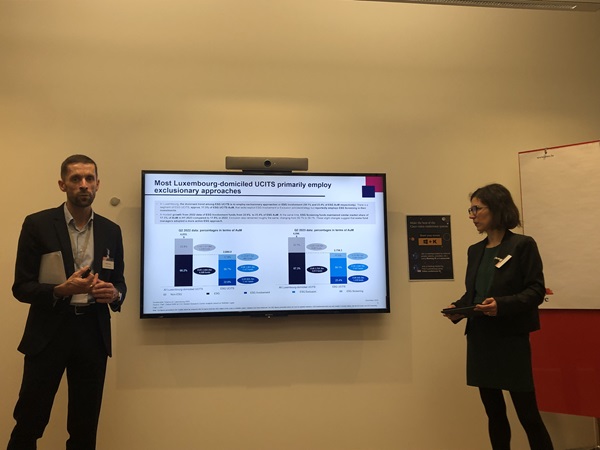 Frédéric Vonner, Sustainable Finance and Sustainability Leader at PwC Luxembourg; Nicoletta Centofanti, CEO of LSFI;
Credit: Otilia Dragan/Chronicle.lu
Frédéric Vonner, Sustainable Finance and Sustainability Leader at PwC Luxembourg; Nicoletta Centofanti, CEO of LSFI;
Credit: Otilia Dragan/Chronicle.lu
On Thursday 14 December 2023, the Luxembourg Sustainable Finance Initiative (LSFI) presented the key findings of its study “Sustainable Finance in Luxembourg 2023: An expanded overview” at a press conference on the premises of PwC Luxembourg.
The study, executed in collaboration with PwC Luxembourg, examines the current situation of sustainable finance in Luxembourg's financial industry. It includes a detailed data-driven analysis examining the main strategies used for environmental, social and governance (ESG) factors. The analysis breaks down sectors and types of assets, with a focus on investment funds. Additionally, this year's edition of the study has expanded its scope to explore how European Union (EU) regulations on sustainable finance have been put into practice by financial institutions in Luxembourg, including asset management, banking and insurance. It also gives an overview of how key players in Luxembourg's financial sector are involved in global efforts to address climate change (initiatives and tools), an aspect not covered in last year's study.
According to the study, ESG funds account for 67.3% of Luxembourg's overall undertakings for collective investment in transferable securities (UCITS) assets under management (AuM), reaching €2.8 trillion in assets by the end of June 2023 and recovering from the previous year. In 2022, ESG funds showed greater resilience than non-ESG funds, as the former saw net outflows of €76.9 billion, while the latter saw net outflows of €98.6 billion. However, in the first half of 2023, ESG funds registered €21.3 billion net outflows while non-ESG registered €20.7 billion net inflows.
Asset managers headquartered in the United States and France remained the top ESG managers in Luxembourg, with US-based asset managers accounting for €756.6 billion in AuM. This represented a similar situation to 2022, Frédéric Vonner, Sustainable Finance and Sustainability Leader at PwC Luxembourg, noted: “The USA and France still keep the top two positions, the UK became third, Switzerland went down to fourth place, German based asset managers are still on place five. We have not observed a major change or shift.”
As for ESG Strategies, the study found that 59.1% of ESG UCITS assets belonged to funds that only applied the ESG Exclusions strategy. Among these, 72.8% implemented a minimum of three exclusions, primarily targeting the weapons, tobacco and fossil energy sectors.
The majority (82%) of ESG Involvement funds strictly adhered to a single sub-strategy. The Best-in-Class and Sustainable Development Goals (SDG) sub-strategies were the most common within the ESG Involvement cluster, representing 37.7% and 37.5% respectively. In 2022, Best-in-Class funds attracted the highest net inflows from investors, totalling €3.5 billion, and maintained strong performance in the first half of 2023, with inflows amounting to €2.5 billion. Microfinance emerged as the least prevalent sub-strategy, constituting only 2% of ESG Involvement funds.
Regarding participation in climate initiatives and tools, a minority of companies based in Luxembourg were identified as adhering to one of the following: the Glasgow Financial Alliance for Net Zero (GFANZ), the Partnership for Carbon Accounting Financials (PCAF) and the Science-Based Targets Initiative (SBTi).
Among the analysed initiatives and tools, PCAF emerged as the least favoured, with merely 8% of all entities adhering to it. The LSFI noted that the outcome report from its Working Group on Climate Measurement and Reporting has advocated the adoption of PCAF by financial institutions to achieve net-zero objectives. Subsequent editions of the study will continue to track this data point. Furthermore, Nicoletta Centofanti, CEO of the LSFI, noted that plans are in the works to present an end-of-January report, explaining what the LSFI did and presenting its members and tools. The LSFI also plans on offering a masterclass on PCAF at the beginning of 2024 and another one later in the year.
The investment fund industry remains the only sector for which (paid) consolidated and aggregated data is publicly available, Nicoletta Centofanti stressed. Additionally, the assessment of ESG dimensions and data in industry studies relies heavily on data providers, who usually have exclusive control over the collection and classification of ESG data. She added that this study involved large amounts of “manual work” and that it is the first time that such a study is available at the Luxembourg scale.
Nicoletta Centofanti added that the study formed part of the LSFI’s “mission and efforts to assist the Luxembourg financial sector navigate the path toward sustainability. The second edition underscores the sustained growth and evolution of sustainable finance.” She noted that “[d]espite the current status of development, the efforts undertaken by financial market participants and the various global policies being introduced, this journey is only in its initial stages. Challenges and limitations persist, with a notable focus on data, standardisation and disclosure. Moving forward, crucial steps include further data availability and comparability. These are vital measures for the industry’s development, as well as to effectively measure and monitor progress.”
Frédéric Vonner concluded: “In recent years, a significant paradigm shift has taken place, particularly following the official adoption of the United Nations' Sustainable Development Goals and the Paris Agreement. European Union policymakers have been at the forefront of advocating for sustainability, spearheading initiatives like the EU Action Plan on Sustainable Finance and the groundbreaking European Green Deal. These initiatives aim not only to position Europe as the inaugural climate-neutral continent but also to play a pivotal role in fostering the worldwide shift toward a sustainable economy.”
The full study can be accessed at the following link.








